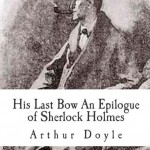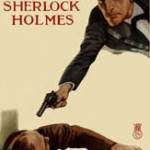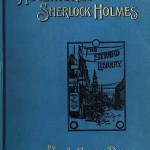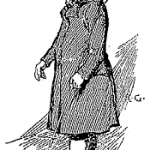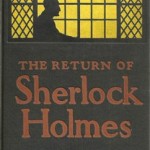I felt some reflection of his elation in my own mind, for I knew well that he would not depart so far from his usual austerity of demeanour unless there was good cause for exultation. All the long November evening I waited, filled with impatience for his return. At last, shortly after nine o’clock, there arrived a messenger with a note:
Am dining at Goldini’s Restaurant, Gloucester Road, Kensington. Please come at once and join me there. Bring with you a jemmy, a dark lantern, a chisel, and a revolver.
S.H.
It was a nice equipment for a respectable citizen to carry through the dim, fog-draped streets. I stowed them all discreetly away in my overcoat and drove straight to the address given. There sat my friend at a little round table near the door of the garish Italian restaurant.
“Have you had something to eat? Then join me in a coffee and curacao. Try one of the proprietor’s cigars. They are less poisonous than one would expect. Have you the tools?”
“They are here, in my overcoat.”
“Excellent. Let me give you a short sketch of what I have done, with some indication of what we are about to do. Now it must be evident to you, Watson, that this young man’s body was PLACED on the roof of the train. That was clear from the instant that I determined the fact that it was from the roof, and not from a carriage, that he had fallen.”
“Could it not have been dropped from a bridge?”
“I should say it was impossible. If you examine the roofs you will find that they are slightly rounded, and there is no railing round them. Therefore, we can say for certain that young Cadogan West was placed on it.”
“How could he be placed there?”
“That was the question which we had to answer. There is only one possible way. You are aware that the Underground runs clear of tunnels at some points in the West End. I had a vague memory that as I have travelled by it I have occasionally seen windows just above my head. Now, suppose that a train halted under such a window, would there be any difficulty in laying a body upon the roof?”
“It seems most improbable.”
“We must fall back upon the old axiom that when all other contingencies fail, whatever remains, however improbable, must be the truth. Here all other contingencies HAVE failed. When I found that the leading international agent, who had just left London, lived in a row of houses which abutted upon the Underground, I was so pleased that you were a little astonished at my sudden frivolity.”
“Oh, that was it, was it?”
“Yes, that was it. Mr. Hugo Oberstein, of 13 Caulfield Gardens, had become my objective. I began my operations at Gloucester Road Station, where a very helpful official walked with me along the track and allowed me to satisfy myself not only that the back-stair windows of Caulfield Gardens open on the line but the even more essential fact that, owing to the intersection of one of the larger railways, the Underground trains are frequently held motionless for some minutes at that very spot.”
“Splendid, Holmes! You have got it!”
“So far–so far, Watson. We advance, but the goal is afar. Well, having seen the back of Caulfield Gardens, I visited the front and satisfied myself that the bird was indeed flown. It is a considerable house, unfurnished, so far as I could judge, in the upper rooms. Oberstein lived there with a single valet, who was probably a confederate entirely in his confidence. We must bear in mind that Oberstein has gone to the Continent to dispose of his booty, but not with any idea of flight; for he had no reason to fear a warrant, and the idea of an amateur domiciliary visit would certainly never occur to him. Yet that is precisely what we are about to make.”
“Could we not get a warrant and legalize it?”
“Hardly on the evidence.”
“What can we hope to do?”
“We cannot tell what correspondence may be there.”
“I don’t like it, Holmes.”
“My dear fellow, you shall keep watch in the street. I’ll do the criminal part. It’s not a time to stick at trifles. Think of Mycroft’s note, of the Admiralty, the Cabinet, the exalted person who waits for news. We are bound to go.”
My answer was to rise from the table.
“You are right, Holmes. We are bound to go.”
He sprang up and shook me by the hand.
“I knew you would not shrink at the last,” said he, and for a moment I saw something in his eyes which was nearer to tenderness than I had ever seen. The next instant he was his masterful, practical self once more.
“It is nearly half a mile, but there is no hurry. Let us walk,” said he. “Don’t drop the instruments, I beg. Your arrest as a suspicious character would be a most unfortunate complication.”

